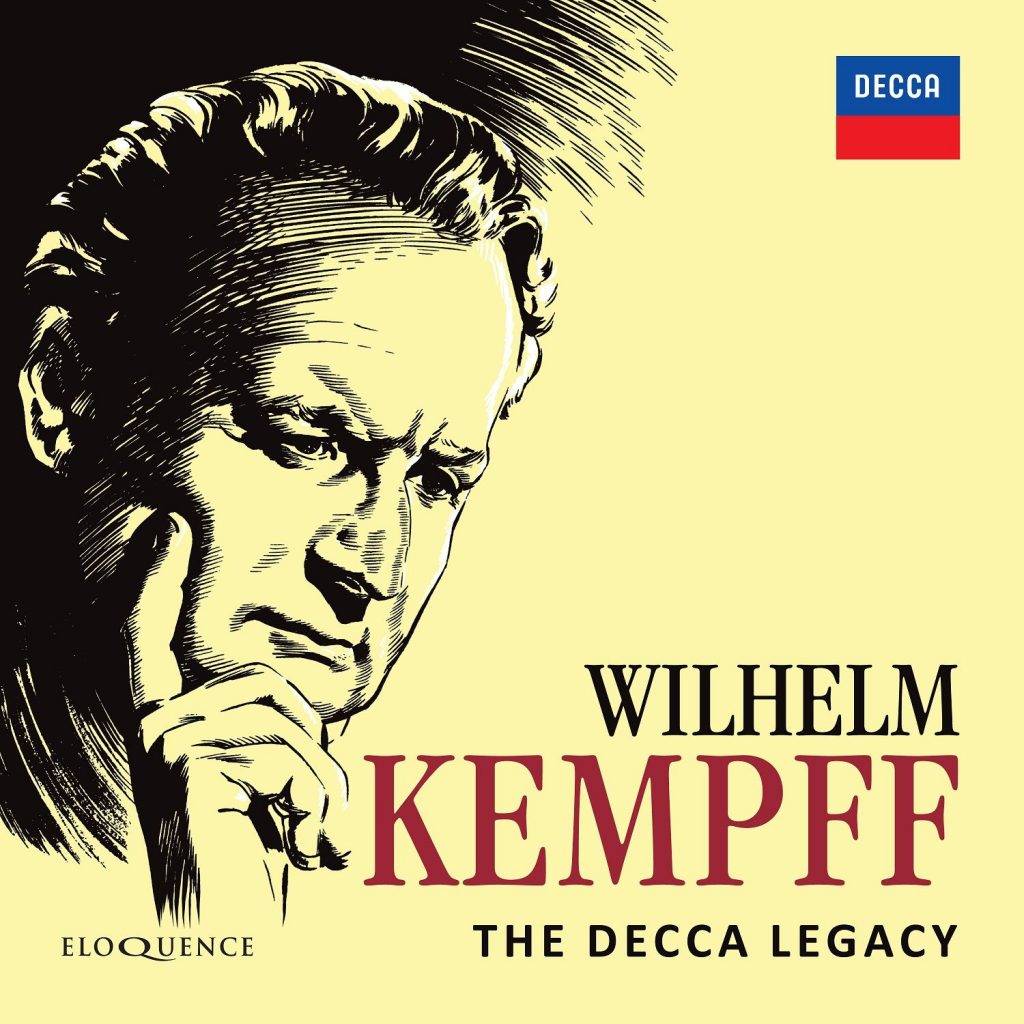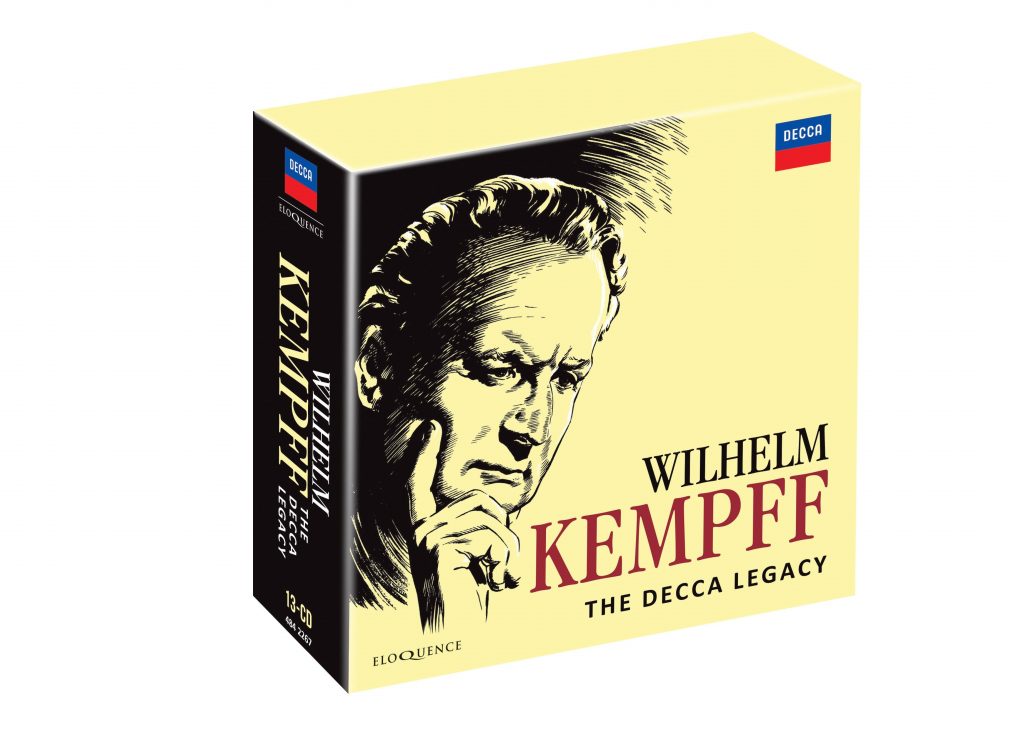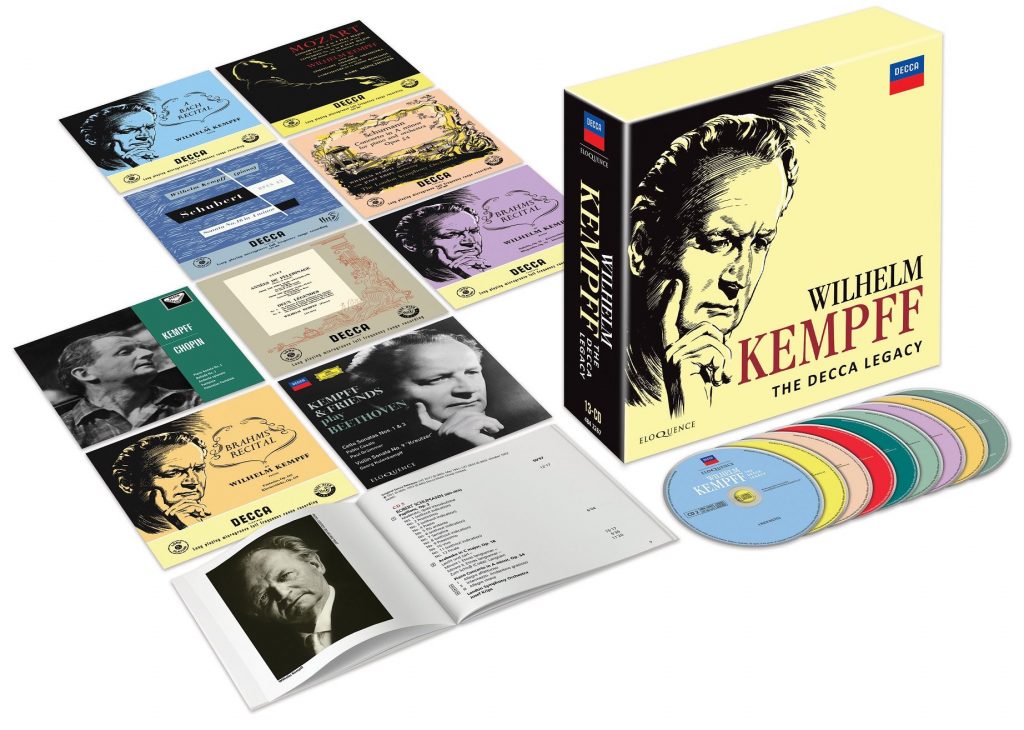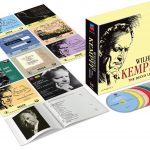Wilhelm Kempff is known, with good reason, as a Beethoven interpreter of sublime simplicity, with several cycles of the concertos and sonatas to his credit, all of them recorded for DG. However, he began recording as early as 1918 and made records for Polydor before the war, as well as for Decca during the 1950s. While his DG recordings have rarely been out of the catalogue, his legacy on other labels has never been so comprehensively documented as it is on this newly remastered set from Eloquence.
Offered as a ‘historical’ appendix are Kempff’s Polydor recordings of Beethoven sonatas with like-minded and recreative partners including the violinist Georg Kulenkampff (the ‘Kreutzer’) and the cellists Pablo Casals (Cello Sonata Op. 5 No. 1) and Paul Grümmer (Cello Sonata Op. 69), better known as a long-standing member of the Busch Quartet. These pre-war and mid-war recordings, newly remastered, add significantly to our understanding of Kempff as an artist of extraordinarily wide sympathies and imagination.
The same could be said of his Decca legacy, which in its complete form should dispel the tenacious myth that he was first and foremost a Beethoven pianist. In 1950 he began recording the solo music of Brahms in the 78 era, with repertoire which he then recorded again in 1953 for LP. In the 1953 sessions he also recorded the composer’s late piano music, which is touched with an elusive grace that very few pianists find as surely as Kempff. Of interest to many will be previously unpublished material (Rameau, Brahms) as well as Kempff’s first – and extremely rare – recordings for Decca of music by J.S. Bach, receiving their first release on CD.
In the booklet essay for the box, Alfred Brendel explains how he particularly esteems Kempff’s Decca recordings, for the piano sound captured at the company’s studios in West Hampstead in London, and also how he prizes the pianist’s recordings of Liszt above all: ‘truly legendary’. He recalls seeing Kempff play Schubert’s Sonatas D.845, which Decca also captured, as an inspiration for his own subsequent dedication to the composer’s piano sonatas. A pair of Mozart concertos, KV 271 and KV 450, finds Kempff’s phrasing at its most limpid and apparently effortless. His Decca discography concluded in fine style in 1958 with sessions which yielded three LP albums of Chopin.
Several of these recordings have previously appeared in previous sets dedicated to Kempff but this is the first complete survey of his Decca legacy. Combined with the rare pre-war recordings, new remasterings and detailed editorial support (including a discographical essay by Michael Gray and one by the late Michael Steinberg), this set of Wilhelm Kempff will attract the attention of all pianophiles. ‘When he is at his best, he plays more beautifully than any of us.’ (Alfred Brendel)
CD 1
J.S. Bach; Handel; Couperin; Rameau; Beethoven; Brahms
CD 2
J.S. BACH Chromatic Fantasia and Fugue, BWV 903; Chorale-Preludes (arr. Kempff)
CD 3
MOZART Piano Concertos Nos. 9 & 15
Karl Münchinger
CD 4
SCHUBERT Piano Sonatas Nos. 16 & 21
CD 5
SCHUMANN Papillons; Arabeske; Piano Concerto
Josef Krips
CD 6
CHOPIN Piano Sonata No. 2; Impromptus; Berceuse; Barcarolle; Nocturne Op. 9 No. 3; Scherzo No. 3
CD 7
CHOPIN Piano Sonata No. 3; Ballade No. 3; Andante spianato et Grande polonaise brillante; Fantaisie; Polonaise-Fantaisie
CD 8
LISZT Années de pèlerinage (excerpts); Deux Légendes
CD 9
LISZT Piano Concerto Nos. 1 & 2
Anatole Fistoulari
CD 10
BRAHMS Rhapsodies, Op. 79; Intermezzi, Op. 117; Klavierstücke, Op. 118
CD 11
BRAHMS Ballades, Op. 10; Klavierstücke, Op. 76; Rhapsodies, Op. 79; Intermezzi, Op. 117
CD 12
BRAHMS Fantasias, Op. 116; Klavierstücke, Op. 119
CD 13
BEETHOVEN Cello Sonata, Op. 5 No. 1
Pablo Casals
Cello Sonata, Op. 69
Paul Grümmer
Violin Sonata Op. 47 ‘Kreutzer’
Georg Kulenkampff
CD 1
(Tracks 1-5)
Recording Producer: unknown
Balance Engineer: unknown
Recording Location: Decca Studios, West Hampstead, London, UK, 25 October 1949
Audio Restoration: Mark Obert-Thorn
Matrix nos.: AR 14217 (BWV 147); AR 14218 (BWV 645); AR 14215 (BWV 659); AR 14222 (BWV 727); AR 14219-21 (BWV 903)
Original Decca 78rpm Releases: Decca K 28224 (BWV 147, BWV 645); K 28223 (BWV 659); K 28226 (BWV 727); K 28225-26 (BWV 903): c. September 1950
P 1950 Decca Music Group Limited
MONO
Kempff’s transcription of the Siciliano from Bach’s Flute Sonata, BWV 1031 (matrix no. AR 14216) was also recorded at the October 1949 sessions and was issued on the reverse side of Nun komm, der Heiden Heiland (K 28223), but, if ever published, has not been located. The transfers for BWV 645, 659 and 727 were from a tape transfer in the Decca archive and that for BWV 147 and 645 from a shellac copy of the published recording.
(Tracks 6-13)
Recording Producer: unknown
Balance Engineer: unknown
Recording Location: Decca Studios, West Hampstead, London, UK, 24 March 1950 (Rameau: Musette en Rondeau, Brahms), 23 May 1955 (Handel, Couperin, Rameau: Le Rappel des oiseaux, Beethoven)
Audio Restoration: Mark Obert-Thorn (Rameau: Musette en Rondeau, Brahms); Brahms digital transfer by Andrew Hallifax
Original Decca Releases: 71083 (Couperin, Rameau: Le Rappel des oiseaux): September 1955; LW 5212 (Beethoven, Handel): December 1955 (Beethoven also released as 71091: October 1955)
P 1955 (Couperin: Le Carillon de Cythère; Rameau: Le Rappel des oiseaux; Beethoven; Handel), 2021 (Rameau: Musette en Rondeau), 2022 (Brahms) Decca Music Group Limited
MONO
CD 2
Recording Producer: unknown
Balance Engineer: unknown
Recording Location: Decca Studios, West Hampstead, London, UK, 30 March 1953
Original Decca Release: LXT 2820: September 1953
P 1953 Decca Music Group Limited
MONO
CD 3
Recording Producer: Victor Olof
Balance Engineer: Gil Went
Recording Location: Victoria Hall, Geneva, Switzerland, September 1953
Original Decca Release: LXT 2861: July 1954
P 1954 Decca Music Group Limited
MONO
CD 4
Recording Producer: unknown
Balance Engineer: unknown
Recording Location: Decca Studios, West Hampstead, London, UK, 31 March 1953 (D.845), 10 November 1950 (D.960)
Original Decca Releases: LXT 2834 (D.845): October 1953; LXT 2577 (D.960): May 1951
P 1951 (D.960), 1953 (D.845) Decca Music Group Limited
MONO
CD 5
Recording Producers: Victor Olof (Piano Concerto), unknown (Papillons, Arabeske)
Balance Engineers: Kenneth Wilkinson (Piano Concerto), unknown (Papillons, Arabeske)
Recording Locations: Kingsway Hall, London, UK, 26–27 March 1953 (Piano Concerto); Decca Studios, West Hampstead, London, UK, 5 November 1951 (Papillons, Arabeske)
Original Decca Releases: LXT 2806 (Piano Concerto): July 1953; LXT 2670 (Papillons, Arabeske): March 1952
P 1952 (Papillons, Arabeske), 1953 (Piano Concerto) Decca Music Group Limited
MONO
CD 6
Recording Producers: James Walker, Ray Minshull
Balance Engineer: unknown
Recording Location: Decca Studio 1, West Hampstead, London, UK, 24–28 February 1958
Original Decca Releases: SXL 2025 (Piano Sonata No. 2): May 1959; SXL 2024 (Impromptus, Fantaisie-Impromptu, Berceuse, Barcarolle, Nocturne, Scherzo): February 1959
P 1959 Decca Music Group Limited
STEREO
CD 7
Recording Producers: James Walker, Ray Minshull
Balance Engineer: unknown
Recording Location: Decca Studio 1, West Hampstead, London, UK, 24–28 February 1958
Original Decca Releases: SXL 2025 (Piano Sonata No. 3): May 1959; LXT 5445 (Ballade No. 3, Andante spianato et Grande polonaise brillante, Fantaisie in F minor, Polonaise-Fantaisie): September 1958 (also released on SXL 2081: January 1959)
P 1958 (Ballade No. 3, Andante spianato et Grande polonaise brillante, Fantaisie in F minor, Polonaise-Fantaisie), 1959 (Piano Sonata No. 3) Decca Music Group Limited
STEREO
CD 8
(Tracks 1-8)
Recording Producer: unknown
Balance Engineer: unknown
Recording Location: Decca Studios, West Hampstead, London, UK, 13 November 1950
Original Decca Release: LXT 2572: May 1951
P 1951 Decca Music Group Limited
MONO
(Tracks 9-11)
Recording Producer: unknown
Balance Engineer: unknown
Recording Location: Decca Studios, West Hampstead, London, UK, 5 November 1951
Original Decca Release: LXT 2670: March 1952
P 1952 Decca Music Group Limited
MONO
CD 9
Recording Producer: Peter Andry
Balance Engineer: Kenneth Wilkinson
Recording Location: Kingsway Hall, London, UK, 2 & 4 June 1954
Original Decca Release: LXT 5025: March 1955
P 1955 Decca Music Group Limited
MONO
CD 10
Recording Producer: unknown
Balance Engineer: unknown
Recording Location: West Hampstead Studios, London, UK, 23 March 1950 (Op. 118), 24 March 1950 (Op. 79, Op. 117)
Original Decca Releases: LX 3033 (Op. 79, Op. 117): March 1951; LX 3032 (Op. 118): March 1951 (Op. 118 Nos. 2 & 3 also released on X363: October 1950)
P 1951 (Op. 79, Op. 117, Op. 118), 2022 (Op. 118 No. 6 – alternative takes) Decca Music Group Limited
MONO
CD 11
Recording Producer: John Culshaw
Balance Engineer: unknown
Recording Location: Decca Studios, West Hampstead, London, UK, 23 & 26 November 1953
Original Decca Releases: LXT 2914 (Ballades, Klavierstücke Op. 76): March 1954; LX 3134 (Rhapsodies, Intermezzi Op. 117): September 1954
P 1954 Decca Music Group Limited
MONO
CD 12
Recording Producer: John Culshaw
Balance Engineer: unknown
Recording Location: West Hampstead Studios, London, UK, 23, 26, 27 May 1953
Original Decca Release: LXT 2935: June 1954
P 1954 Decca Music Group Limited
MONO
CD 13
(Tracks 1-2)
Producer: unknown
Balance Engineer: unknown
Recording Location: Prades, France, July 1961
Original Philips Release: 835101
P 1962 Universal International Music B.V.
LIVE RECORDING – STEREO
(Tracks 3-6)
Producer: unknown
Balance Engineer: unknown
Recording Location: Alte Jakobstraße – Raum IX, Berlin, 24 July 1936
Transfers and Mastering: Christophe Hénault (Studio Dante)
Matrix Nos: 609–13 gs
Original 78rpm Grammophon/Polydor Release: 57035–7
P 1936 Deutsche Grammophon GmbH, Berlin
(Tracks 7-9)
Recording Producers: Oskar Blaesche, Hrich Ehrich
Recording Location: Germany, 27 May 1935
Transfers: David Lennick
Mastering: Christophe Hénault (Studio Dante)
Matrix Nos: 505–506 gs
Original 78rpm Grammophon/Polydor Release: 35017–20, 67062–65
P 1935 Deutsche Grammophon GmbH, Berlin
“The best I have ever heard … A really startling achievement.” Gramophone, July 1935 (Beethoven: ‘Kreutzer’ Sonata)
“There is superb playing here … a wonderful spontaneity and flow.” Gramophone, January 1960 (Beethoven: ‘Kreutzer’ Sonata)
“I have nothing but praise for this great pianist’s sensitive and musicianly playing. He catches perfectly the mood of every little picture in Papillons.” Gramophone, July 1952 (Schumann)
“The Petrarch Sonnets are played with the intimacy that is needed, and passionate feeling that is never exaggerated.” Gramophone, July 1952 (Liszt)
“This new recording by Mr. Kempff is in the same high class, and it has the distinction of a finely led and recorded orchestral performance, one that is exceptionally alive rhythmically. Mr. Kempff phrases most beautifully, with a winning simplicity and gentleness.” High Fidelity, November 1953 (Schumann: Piano Concerto)
“Mr. Kempff’s romanticized Bach lures the ear with some melting pianism … in the transcriptions the gauge of his mild excesses is the Siciliano, which for him is a melancholy song, beautiful in effect.” High Fidelity, January 1954
“Kempff’s broad style is admirably suited to the works in this group, which he treats on a grand scale, tempered generously with sensitivity. The reproduction is full, round, and warm.” High Fidelity, March 1955 (Brahms: Klavierstücke Op. 119)
“Kempff’s interpretation of these pieces is generally quiet and thoughtful. It has been well recorded, too.” High Fidelity, March 1955 (Brahms: Ballades Op. 10)
“Almost faultless performances and marvellously proportioned sound.” High Fidelity, June 1955 (Mozart: Concertos KV 271 & KV 450)
“Whatever Kempff attempts, he accomplishes with a rare blend of virtuosity and scholarship, of brilliance and fastidiousness. There is a distinct personality that seems to emerge from his playing of any composer’s work, in addition to his stylistic rightness.” Stereo Review, April 1958 (Schumann)
“Kempff plays magnificently – with strength, maturity, and a degree of pianistic flexibility that makes the crabbed writing sound actually limpid. The performance is of so high a quality as to make even those indifferent to this work reconsider.” High Fidelity, January 1959 (Beethoven: Cello Sonata Op. 5 No. 1)
“One does not normally associate a Beethoven-Schumann-Brahms specialist like Kempff with the piano music of Chopin, yet … the performances of the two Sonatas are surprisingly idiomatic.” Stereo Review, April 1959 (Chopin, Sonatas)
“Kempff’s interpretations of the Liszt stand up very well in terms of sound. and his echt-Deutsch pianism remains interesting for its heavy pedaling and spaciousness.” High Fidelity, February 1963 (Liszt: Concertos)
“Kempff seems to go instinctively and effortlessly deep into the spirit and essence of this music – he makes me forget about him, in fact, and hear only the music.” Stereo Review, March 1974 (Liszt: Année de Pèlerinage II (Italie)
“In the earlier version [of the Sonata D. 845] he is lighter and more transparent, bringing out the poetry more intensely, yet emphasising structural strength.” Gramophone, July 1999 (Schubert)
“What a breath of fresh air Kempff’s performance [of Papillons] is, with just the right degree of insouciance and a real twinkle in the eye. Another highlight is the Arabeske, which is completely unfussy but gets to the heart of the matter with tremendous eloquence.” Gramophone, March 2014 (Schumann)
“One senses his spiritual affinity with the composer: his Chopin radiates such subtle nuances and such brilliance, so much elegant fluency and – in the Polonaises and the Fantasy – so much seriousness and dignity that these recordings can hold their own in any company.” Gregor Wilmes
“There was scarcely any other pianist in the twentieth century who had as distinctive a musical profile as Wilhelm Kempff” Ingo Harden







